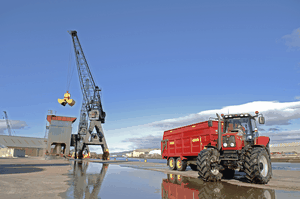Docks tractors beat lorries for fast unloading
While working at Glasgow docks, earning extra income during the lean winter months, farmer/contractor Andrew Hamilton spotted a huge opportunity.
He saw the need for a haulage fleet and now employs 20 staff and runs up to eight tractors and specialist trailers that every year haul more than 370,000t of feed from the ships to store.
Mr Hamilton farms about 250 acres (100ha) 30 miles from Glasgow.
But because the farm could not support him and his father, he branched into small-scale contracting about 15 years ago.
“While working in the docks I watched the unloading operation and realised I could do a better, faster and safer job with tractors and trailers.
The previous set-up used old, unreliable lorries, which were clumsy and had difficulty manoeuvring around the buildings.
“Also, the driver would stop short of the pile, jump out, unlatch the door, get back in, tip and pull forwards and then get out again to latch the tailgate.
“Not only were the operators working in the dust, it also took time clambering into and out of the cab,” he says.
Mr Hamilton put his proposal to the docks company and set up a time comparison trial.
“From the look on their faces, when I mentioned tractors and trailers, I’m certain they imagined a bunch of bumpkins turning up with old Massey 135s.”
But in this simple test the farm’s tractor and unmodified silage trailer, carrying 18t, took 2.5mins off the turn-around time.
And that was without hydraulically-operated tailgates, which promised to save even more time, keeping the operators in the cab.

He won the contract and started work in March 2005.
He now runs six of his own tractors and calls on two sub-contractors as the workload dictates.
He also uses a fleet of seven purpose-built trailers, with two farm-based units for back-up.
The tractors are a mixture of used and new Massey Fergusons.
“We have used MFs for years and I felt it was important that, with a mix of different drivers, all the tractors were the same.”
His local dealer Reekie found three second-hand tractors to get started and Mr Hamilton sub-contracted in three more.
He has since bought a new MF 6485, which along with an MF 6480 has cab and axle suspension.
All the tractors have the Dynashift four-speed powershift transmission, with an auto-shifting facility on the new MF 6485 and an
MF 6270.
“Dynashift is perfect for this work. But as we update we will move to the same spec as the newer tractors,” he says
“AutoDrive’s ability to change the gears automatically is very helpful, particularly as it means it is always in the right gear for pulling away.”
The tractors haul with purpose-made trailers built by Aberdeen-based Marshalls.
“I went to them because they are local and they were prepared to develop a monocoque trailer to our bespoke specification.”
Andrew Hamilton now has six 14-tonners and one 16t version, specifically designed for the docks’ haulage operation.
These have commercial axles, sprung drawbars and a special hydraulically-operated tailgate, which swings right over the top of the body and out of the way when tipping.
“We have unloaded over 370,000t from ships since March 2005 plus a lot of other work shifting material within the docks.
“Apart from a set of tyres, they are still like new.
They are remarkably good trailers and have done more in one year than they would normally carry in several lifetimes,” he adds.
The set-up works 24 hours a day until the ships are unloaded, although they do get a break until the next boat arrives.
Mr Hamilton’s drivers work 12-hour shifts, are all self-employed and are mostly farmers earning extra income in much the same way he started at the docks.
The tractors and trailers first drive over a weighbridge empty and then drive under a large unloading hopper, which is filled by a crane fitted with a 20t “clam shell” bucket that empties the boat’s hold.
The hopper fills an 18t trailer in 15 seconds.
Then it is back over the “loaded” weighbridge and off to tip in the relevant store.
Trip times vary, with the closest haul taking less than three minutes, which, incidentally, is nearly two minutes quicker than the lorries used before.

